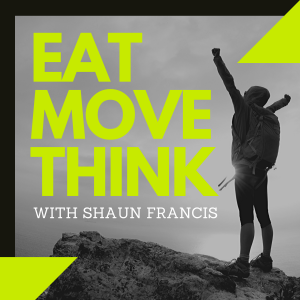Miscellaneous
When the holistic psychologist Dr. Nicole LePera decided that traditional therapy wasn’t working for her, or her clients, she began exploring the mind-body connection, and the responsibility of what she calls “self healers” to exert effort every day toward bringing about a desired life transformation. Dr. LePera eventually used social media to create a community of motivated #selfhealers, and wrote a book, the recent New York Times bestseller, How To Do the Work. Here, Dr. LePera is in conversation with Medcan’s clinical director of mental health, Dr. Jack Muskat. https://www.eatmovethinkpodcast.com/podcast/ep-66-how-to-do-the-work LINKS Dr. Nicole LePera is on Instagram, Facebook and YouTube. Her website is www.yourholisticpsychologist.com. LePera’s book is How To Do the Work: Recognize Your Patterns, Heal from Your Past, and Create Your Self. Buy it at Indigo and Amazon. Medcan provides mental health-promoting services for clients featuring appointments with a team of psychologists led by Clinical Director Dr. Jack Muskat. Learn more. To arrange an appointment, contact 416.350.5959 or mentalwellbeing@medcan.com. INSIGHTS Mind matters. The power of positive thinking is real. In her book, Dr. LePera shares the story of one man who received a terminal cancer diagnosis, and was told he only had three months left to live. He was, understandably, quite distraught over the revelation and, sure enough, he died a few months later. But when an autopsy was conducted, it was discovered that he had been misdiagnosed. He didn’t have cancer. The implication? The mind can create self-fulfilling prophecies. Dr. LePera knows this is an extreme example, and there are many other factors at play, of course. But, in her opinion, this devastating story makes something very clear: “It’s important to acknowledge that the mind is an incredibly powerful tool for healing,” she says. If you continuously give into overwhelmingly negative thoughts, you risk getting stuck in certain cycles. [2:15] Key concepts. Dr. LePera calls herself a “holistic psychologist,” but what does that mean? For her, it’s a two-part definition. “One [is about] acknowledging that we’re not just a mind, and that our body is somehow separate. We’re an integrated being,” she explains, adding that those two elements are always in communication with each other. The second part? It’s about taking that interconnectedness and looking at how it can affect our overall health. “Holistic means honouring the whole being — mind, body and soul — and understanding that many of the symptoms we experience are likely coming from an imbalance in one of those deeper areas of being.” [05:45] New perspectives. In her book, Dr. LePera details how to use self-healing to improve your life. As the title suggests, it’s all about “doing the work.” The first step is to “honour the change that comes when we begin to actualize new choices,” she says. It’s not just enough to think differently — you have to commit to a daily action that will eventually create change. “A lot of us are very [habitual] in how we feel about ourselves and the role we play in our relationships. We have to learn how to shift out of that autopilot,” Dr. LePera says. “[It’s a] choice to create consciousness. We need to actually learn how to bear witness and make those new choices in real time.” [06:55] Learn to let go. Knowing how to do the work is one thing. Actually doing it is completely different. It can be especially challenging when our subconscious is inherently illogical — we are creatures of habit and crave the safety of familiarity. When we make a change, it’s natural for us to resist it, and before we know it, we’re reverting back to the old habits we were trying to fix. But that feeling of discomfort is necessary. It’s the signal that we’re doing the work. “Expect resistance and know that it’s coming from our subconscious as its best attempt to keep us safe,” Dr. LePera says. “We can thank it in that moment, but still choose to show up and make those new choices that will inherently create more unfamiliar experiences and resistances, yet now [we] can empower [ourselves] because we know what it is.” [10:00] Support system. Much of Dr. LePera’s work may be focused on self-healing and doing your own work, but that doesn’t mean it’s an entirely solitary exercise. Having a strong, supportive community surrounding you is still important — wherever you can find it. “We heal in community,” she says. “For some of us, the best communities, or the safest communities, that we can find right now exist online. They maybe aren’t in our neighbourhoods or in our immediate communities, so going online and finding that safety is incredibly important.” [12:40] Upside down. It’s not a surprise that COVID-19 has interrupted all our patterns and disrupted our lives. This can cause us to feel unsafe, which is further complicated by any other challenges, insecurities or grief that we’ve had to face during the pandemic. In situations like this, we have to “learn how to cultivate safety” by being present and conscious. She recommends engaging in a sensory activity, like focusing on your breathing or lighting your favourite candle to hone in on the present moment. [18:55] Accept this. No matter how much you may want to try, you cannot change another person. “When we feel like we want to change a relationship, or a relationship isn’t working for us, we think, ‘Okay, if this person would do [this] differently, I would feel differently,’” Dr. LePera explains. But you can only empower yourself to make changes. Everyone else has to do the work for themselves. If necessary, you can create boundaries or separations in relationships to change their function in your life. [25:25]

